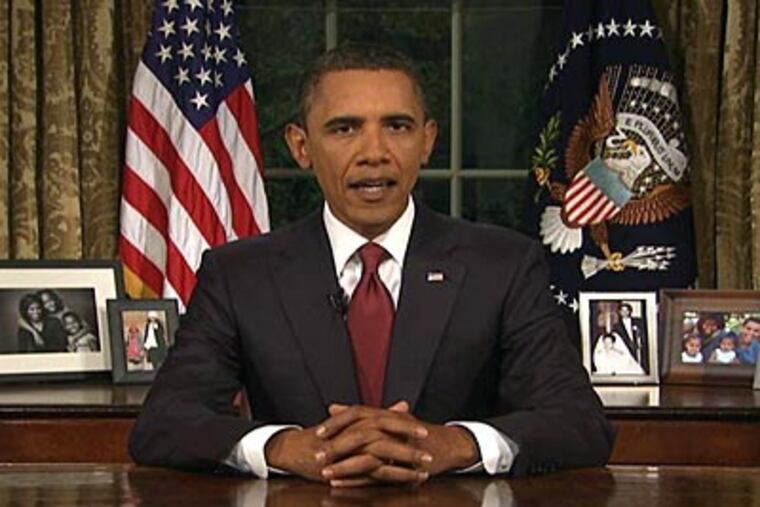Editorial: Moving on in Iraq
Given President Obama's opposition to the war in Iraq, he did a commendable job of highlighting our troops' achievements as the combat mission ends.

Given President Obama's opposition to the war in Iraq, he did a commendable job of highlighting our troops' achievements as the combat mission ends.
It would have been hypocritical of this president to declare "victory" in his address to the nation Tuesday night. Not only did Obama oppose the war from the start, but Iraq's future is far from certain.
It was therefore unreasonable for conservative critics such as House Minority Leader John Boehner (R., Ohio) to expect Obama to give a chest-thumping speech.
Many liberals wanted to hear Obama criticize his predecessor, George W. Bush, for waging war in 2003 under false pretenses. That was another misguided expectation. For Obama to do so would have been unpresidential, and it would have undercut his authority as commander-in-chief.
Instead, Obama urged the country and his Democratic base to "turn the page." He placed the focus where it should be at this moment - on the sacrifices of the troops. The U.S. military toppled Saddam Hussein's brutal regime, defeated the insurgents and terrorists who emerged in its wake, and trained Iraqis to defend themselves. They achieved far more than our elected leaders believed would be required of them.
There was no special significance about the date that Obama chose. About 50,000 U.S. troops remain in Iraq for now as advisers, and unfortunately there will be more casualties even though major combat operations have ended. The bombings in Iraq, although down overall, haven't stopped.
Nevertheless, it was appropriate for the commander-in-chief to pay public tribute now to the military's sacrifices. More than 4,400 U.S. soldiers lost their lives and more than 31,000 were wounded in this war, including 1,511 casualties from Pennsylvania and 543 from New Jersey.
The cost to taxpayers to date has been nearly $750 billion. The nation paid this price, as Obama said, because of "a belief that out of the ashes of war, a new beginning could be born in this cradle of civilization."
The challenge going forward is to not allow those efforts to be squandered. Nearly six months after elections were held in Iraq, rival factions still haven't agreed on a new government. They must forge a coalition if they hope to reduce violence and promote stability.
Obama recognizes the need for a sustained commitment to Iraq through diplomats, aid workers and military advisers. This nation must live up to Obama's pledge to remain a "strong partner" for Iraq in the years ahead.
Turning to Afghanistan, the president was right to ask a war-weary public not to forget what's at stake in the fight against al- Qaeda. The plan is to begin a drawdown of troops next August, but he cautioned it will be dictated by conditions on the ground.
After seven years of war in Iraq, Americans wanted an end to it. Labeling the occasion is far less important than getting the troops out of harm's way at long last.